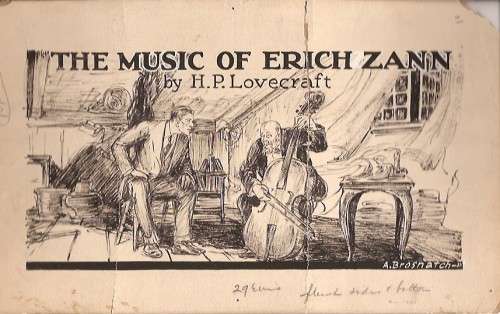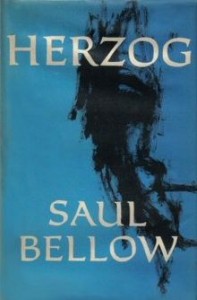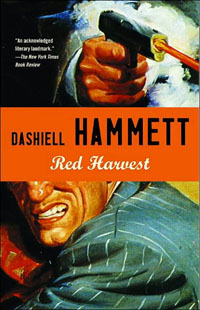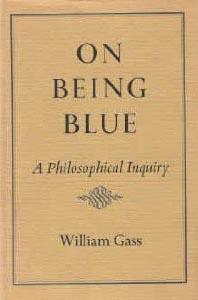Overboard
I.
On this particular evening, the musician allows his fellow lodger in the house on Rue d’Auseil to listen to his feverish viol music. “It would be useless to describe the playing …. He was trying to make a noise; to ward something off or drown something out—what, I could not imagine,” writes H.P. Lovecraft in “The Music of Erich Zann.” The listener, a metaphysics student at an unnamed university, is an interloper, a voyeur who, on hearing Erich Zann fill his garret room with this crazed playing, hopes to peak into the source of the music’s beauty, to penetrate some “far cosmos of the imagination.” On this particular evening, the cosmos stabs back. Lovecraft describes Zann’s playing, which grows “fantastic, delirious, and hysterical …. [l]ouder and louder, wilder and wilder,” until other-worldly chaos and pandemonium explode into the house on Rue d’Auseil and the listener flees. It is a bit much.

Howard Philips Lovecraft wrote “The Music of Erich Zann” in 1917. Over the next 20 years, he would go on to write his best known tales of horror and wonder, those involving Cthulhu, Nyarlathotep, and Azathoth, his mythos monsters, the Great Old Ones whose names you can’t pronounce. The language in “Erich Zann” is toned-down, tolerable, a pale lilac compared to the rich purple of his later prose, where, as Michel Houellebecq writes, “the adjectives and adverbs pile upon one another to the point of exasperation, and he [Lovecraft] utters exclamations of pure delirium.” Most readers would not consider anything by H.P. Lovecraft well-written in the traditional sense, and yet there is power in his work, a majestic and odd darkness that isn’t matched by much else, an appeal to the unimaginable, our dread of looking into the night sky and hoping, only hoping, we’re alone. Lovecraft’s best sentences are always overwrought. There are excesses of bland fright words—“monstrous”, “horrible”, “grotesque”—mixed with archaic vocabulary, weird words that both in texture and meaning evoke the unusual, “eldritch”, “rugose”, “squamose”; there are extended hallucinations, delirious exclamations, and dream descriptions of nightmare cities, all of which are the antithesis of subtlety. All stylistic restraint has been set aside. Lovecraft eschews any kind of linguistic modesty so he can unleash his unmistakably curious vision of cosmic horror and god-things—this is the source of his style.
“HPL would probably have considered a story a failure, if in writing it he did not have a chance to go overboard once at least,” Houellebecq writes in H.P. Lovecraft: Against the World, Against Life (published in France in 1991; translated into English by Dorna Khazeni and published by Believer Books in 2005). Houellebecq, a French novelist who writes about sex, brand names, technodystopian malaise, and ennui-ridden postmodern consciousness (very French, yes), sees Lovecraft as an American original whose uncompromising weirdness and “stylistic explosion[s]” lead to a unique body of work, the sole goal of which is to fascinate the reader. Houellebecq sets Lovecraft up against more mundane sci-fi and horror writers and against all realism. Lovecraft, Houellebecq argues, whose style is defined by precisely that which it’s easiest to criticize, is interesting not in spite of his grandiose and ridiculous prose, but because of it.
Onward with a Grin: A Scene from Herzog by Saul Bellow
 Herzog
Herzog
by Saul Bellow
Originally published by Viking Press, 1964
Buy from Amazon
In the lecture he delivered on the first day of classes at Wellesley College and Cornell University, Vladimir Nabokov tells of a Russian poet who was executed in 1921 because he would not stop smiling. Nikolai Gumilev died on an unknown day in August and, although his Soviet executioners did not know it, the crime for which he was first arrested was most certainly fabricated by their higher-ups. Still, Nabokov says, what truly irked “Lenin’s ruffians” was Gumilev’s steadfast smile, which he held even against the shock of the firing squad.
There is a cheerful morbidity in this anecdote that’s mixed from unpleasant truth, dark absurdity, and the inexorably joyous countenance of a man knowing he must die. There’s also a fundamental comedy of desperation on behalf of the Soviet goons who, at some point during the interrogations, must have flung up their arms up and said that if this poet won’t quit grinning then he has to go, so Gumilev unmindfully did.
This sort of comedy—with its helplessness, muddled terror, and insistent smile—is intertwined with the tragic in Saul Bellow’s fiction. Bellow intermingles sadness with laughter to create desperate comedies of hurt and self-humiliation, which attempt at first to allay pain through punchlines, by turning sorrow into farce. In art, the comic is usually superficial. Laughter is assigned the role of cure-all healer, a wheeler-and-dealer with the snake oil of stock gags and slapstick, where jokes are told to lighten the mood and reduce the gloom; yet Bellow pierces deeper.
For Bellow, laughter is not superficial, nor is it sorrow’s antithesis; for Bellow, laughter is the inherent human response to the incomprehensibility of life and all the flummoxing troubles therein. Comedy, then, becomes the involuntary sidekick that guides Bellow’s heroes who struggle closer to the crux of life’s inadequacies with vigor and a grin. The desperate comedy in Saul Bellow’s fiction forces the tragedy deeper by making it a little more palatable and accurate.
There’s a silly scene from Herzog that’s stuck in my mind for many years. It involves CPR and a monkey. Deep in the novel, Moses Herzog returns to Chicago to visit his young daughter who lives with his ex-wife. Before Herzog meets his daughter, he spends the night with an old friend, Luke Asphalter, a bachelor-zoologist who studies monkeys, and recently Herzog read in a magazine that when one of Asphalter’s subjects died he tried to revive it. “You must have been out of your mind, giving Rocco mouth-to-mouth respiration,” Herzog says. “That’s letting eccentricity go too far.” Asphalter says no one else’s death could have unraveled him the way Rocco’s did.
“You don’t mind if I smile,” Herzog apologized. “I can’t help it.”
“What else can you do?” Asphalter asks.
Is it mad to cherish an animal above all else? Is it insane that Asphalter says, “I was glad I had no wife or kids to hide these crying jags from,” because after Rocco died, he underwent a depression, quit showing at work, and let his beard grow so he’d better resembled the deceased simian? To Herzog it’s funny, devastating but funny, at least, he says, as “these painful emotional comedies” go.
It’s difficult to qualify the comedy in this scene—how it works, what to call it, what sort of reaction it requires; there are not one-word answers. There’s an element of black humor but it’s surpassed by Asphalter’s love and an element of absurdity that corrodes under the tears. There’s physical comedy in the memory of Asphalter attempting to resuscitate Rocco, though it seems less funny once Asphalter admits how much he needed the creature. The cartoon entertainment of a man giving CPR to a monkey mixes with the seriousness of loss. There’s death, loneliness, solitude, cordiality, and Moses Herzog’s continual bafflement as he tries to understand and fails. Asphalter says he’s been experimenting with different psychoanalytic treatments in an attempt to defeat his grief, but nothing helps. “Perhaps he was about to cry. I hope he won’t, thought Herzog. His heart went out to him,” Bellow writes. Then, as Asphalter describes how for one grief therapy session he pretended that he himself was dead—to overcome the sorrow of death by overcoming his own—Herzog thinks about Heidegger’s views and how “human life is far subtler than any of its models, even these ingenious German models. Do we need to study theories of fear and anguish?” This adds a tinge of humorous humility. The grand thinkers, as masterful as they may be, have no words to assuage the awfulness of the death of Rocco the monkey.
“You don’t mind if I smile?” “What else can you do?”
This exchange has guiding force. It’s the force of a smile that protrudes through, a smile mixed a startled, helpless laugh. The scene encapsulates the necessity of laughter, the deep soul-grunt of relief that laughter offers. Pain, loneliness, loss—these casual horrors are held at bay by the rebellious power of Herzog’s chuckle and grin. Laughter can stand up to misery and darkness; laughter is often an act of defiance. Shockingly, the worst of life can be shrugged off with a silly grin. “What else can you do?” These words have echoed in my mind for a long time. It’s a simple exchange, the kind that you could overhear on a bus or have with a friend about something very trivial or serious. Don’t mind if I smile? What else can you do? The facial expression that goes with “What else can you do?” is so particularly human it’s stunning.
Nabokov once described the Chekhovian hero as “a good man who cannot make good,” someone who “stumbles because he is staring at the stars.” One cold night in Chicago a while ago, Moses Herzog crashed on his friend’s couch. And there they were, two injured men laughing, two men who did their best but since when has that ever been good enough? The stars burn with infinite indifference to the plight of dreamers. The stars are beautiful but they cannot guide us.
“Unexpected intrusions of beauty. This is what life is,” Herzog thinks later, while he fills a sink with water and notices the “gray light” of the bathroom and the “almost homogenous whiteness” of the oval basin. The same holds for humor. Unexpected intrusions of laughter, of smiles, are what life is. They make the daily struggle slightly more bearable, knowing that at some point a chuckle, hearty haha, or quiet smile will arrive. Laughter is the necessary response to inexplicable loss and inevitable decay, a required reaction to all the regular and extravagant hurts that mark our days. What else can you do? Out of nowhere sometimes, like a ferocious roar, laughter will burst forth to remind us we are so fiercely, foolishly alive.
***
Alex Kalamaroff is a 26-year-old writer living in Boston. He works on the administrative team of a Boston Public Schools high school. You can read his other writings here or follow him on twitter @alexkalamaroff.
February 10th, 2014 / 10:00 am
Yearning For Elsewhere: André Aciman’s Alibis
 Alibis: Essays on Elsewhere
Alibis: Essays on Elsewhere
by André Aciman
Farrar, Straus and Giroux, 2011
208 pages / Buy from Amazon
In his 2012 collection Alibis: Essays on Elsewhere, André Aciman explores the elsewheres of his life. He contemplates the places he’s lived and traveled to—Cambridge, Rome, Alexandria, Venice, and New York—and ruminates about what his life was like there. Except Aciman isn’t interested in actuality. Throughout this collection, he pursues an imagined past. It’s a touching, at times, fusty perspective where the “what was perhaps and might have been has more meaning than what just is.” It’s the perspective of a man who’s read too many books.
Aciman is reflective in an exquisitely literary way. He calls upon his beloved books and authors to define his experiences. Venice is understood by way of Thomas Mann. Tuscany is seen through the lens of Machiavelli’s letters. There’s “De Quincey’s London, Browning’s Florence, [and] Camus’s Oran,” not to mention Monet’s Bordighera, Virgil’s Rome, and Lawrence Durrell’s vanished Alexandria. This mix of high culture and Old World geography makes Aciman’s writing quite pleasurable. It’s hard not to be charmed by descriptions of Italian farmhouses and unsalted Tuscan bread interwoven with references to Dante. Simultaneously, the constant invocation of canonical literature grows moldy and, over time, seems like an extremely fancy crutch, as though Aciman is unable to experience the world without first quoting Proust and La Fayette.
It’s a delicate snare, one most readers can relate to. As we learn about the world through books and movies, we want to visit that world. Who wouldn’t, after reading Benjamin, Balzac, and Baudelaire, want that Paris over the drab Paris of today—a Paris we know nothing about? The elsewheres Aciman longs for are mirages, and he admits it. But they’re such beautiful mirages it’s easy to believe they’re realer than what goes on outside his hotel room window.
Aciman’s elsewheres are geographically and temporally distant from his present writerly position in “a cork-lined room.” Yet it is only here, sealed away in this room, removed from the hubbub and uproar of regular life, that Aciman’s elsewheres can exist. In “Intimacy,” one of the longer and strongest essays in the collection, he recalls his teenage days living with his mother on Via Clelia, a working-class street in Rome. Aciman and his family are exiles. They escaped Egypt in 1965. And after three years in Italy, they’ll move to America, a country that even decades later Aciman does not consider home. “Home,” he writes in a later essay, “is all together elsewhere.”
When Aciman revisits Via Clelia many years later, he’s tense with anticipation. He wishes for something thrilling to happen, for something to pop out and scream, Remember me? “But nothing happened. I was, as I always am during such moments, numb to the experience.” As it turns out, the old street where he used to live is just that, an old street. The barbershop and plumber’s storefront are gone but the printer’s shop remains. Via Clelia means nothing more or less than it always has. And that’s no good. During the present moments of his revisiting, Aciman’s anticipation and memories are squandered by the “numbness” he inevitably feels, a numbness frequently encountered whenever he’s confronted by the present. Fortunately, what we botch in life, we fix with art.
“It is the craft that makes life meaningful,” Aciman claims, “not the life itself.” This claim is repeated throughout Alibis and in his earlier books as well. Aciman finds meaning not in the moment, but in his memory of the moment, a memory that’s envisioned only long afterward, in that cork-lined room. It’s a claim that sets art up against life, a false dichotomy to be sure, but one that over the course of Aciman’s writing career has calcified into truth.
While analyzing Proust, Aciman describes a “literary time filter” that coats the world. In other essays, this “filter” is called an “illusory film”, “happy film”, or just plain “film.” It’s the façade of art, of artifice, of craft, which makes our past experiences more pleasing, sparkling, and grand, because it allows us to grasp the scintillating details and crystalline moments that are apparent only when we look back, details and moments that, quite naturally, are created by the intensity of our looking back. Aciman writes, “it is not the things we long for that we love; it is longing itself—just as it is not what we remember but remembrance itself that we love.” In eulogizing his past lives, Aciman cherishes not what has vanished or died, but the eulogy itself.
This is an incredibly literary take on life. At times it feels like too much. Aciman values the inventions of memory, where everything glows with the amber light of nostalgia and the spellbound evenings are seeped in melancholy blue, rather than what he quotes Proust as calling the “tyrannie du particulier, the tyranny of [the] day-to-day.” Aciman is entirely unable to enjoy the present moment, the day-to-day-ness of life, with its ephemeral joys and nonstop micro-disasters. The numbness he feels when faced with the immediacy of every passing moment can only be overcome through imaginative, highly referential reflection. “Even the experience of numbness,” he writes, “when traced on paper, acquires a resigned and disenchanted grace, a melancholy cadence that seems at once intimate and aroused compared with the original blah.” It’s this blah that Aciman believes the artist must do everything to defy.
January 27th, 2014 / 10:00 am
A Book To Read In Times Like These: Dashiell Hammett’s Red Harvest
 Red Harvest
Red Harvest
by Dashiell Hammett
Vintage, 1989
224 pages / $14 Buy from Amazon
We’re finished with another election cycle and it’s all same old, same old. For months we’ve been overrun by the expected crap, the lies, corruption, false promises, and general deception. While it might be nice to escape into something delightful, something by Eric Kraft or an imaginative dance like Italo Calvino’s The Baron In The Trees, if you want to read a book that stabs into the thick of the American political scene, then Dashiell Hammett’s first novel is what you need to get your claws on asap. It’s a novel that reminds you how unpleasant politics has always been. Plus, it’s got a lot of great zingers.
There’s a point when Dashiell Hammett’s Red Harvest stops being a detective story and turns into a blood bath. It’s at this point where the novel switches from being a regular tale of intrigue and personal conflict and turns into a masterful portrait of political corruption and violence. Halfway through, our man The Continental Op does a body count. “There’s been what?” he asks the devious dame Dinah Brand. “A dozen and half murders since I’ve been here.” He lists the dead and says, “That’s sixteen of them in less than a week, and more coming up.” The Continental Op copes the way they all used to. He gets drunk, takes some laudanum, and for an instant feels the rosiness of the world. He wakes up with another dead body on his hands. Another morning, another body, another hang-over. It’s a lesson in how any place or day can become a hell-trap. “If I don’t get away soon,” our man says, “I’ll be going blood-simple like the natives.”
Red Harvest is a great political novel because in the end its characters care about only one thing: power. There are no beliefs, no ideologies, no speeches. There’s just power. There are interpersonal squabbles over who killed whose brother or son, but these get forgotten in the struggle over who gets to control the quaint, ruined town of Personville, aka Poisonville. Our man The Continental Op is the only operator interested in salvaging a bit of justice from this wreckage. He sets the mobsters, police, and political head honcho up against each other and keeps prodding until more murders get committed. There’s the usual assortment of baddies and toughs, Pete the Finn, Lew Yard, Whisper, police chief Noonan, and Old Elihu, who’s the most vicious of them all and also The Continental Op’s employer.
February 8th, 2013 / 12:00 pm
The Joys of Oral History
Life is not organized, logical, or factually accurate. Yet we require this of our history books, which must contain names, dates, verifiable pieces of evidence, and claims about cause-and-effect. Event A leads to Event B. Event C happened on December 15th, 1910. Person X was at Place Y During The Conflict of Z. It can all get rather drab and unrealistic. There is something particularly dulling about reading a list of dates and proper nouns and thinking these alone compose our lives. Where’s the hilarity, hurt, daily bafflement, and sense of fun? History books miss out on a lot, particularly the general pell-mell-ness that pervades life, where cause-and-effect is displaced by the indecipherable and happenstance forces that influence our actions and beliefs. This is why oral histories rule.
Oral histories are collections of voices all jousting to be heard. Whether they’re about a life, an era, or a single event, oral histories convey the necessary complexity, where details collide and thesis statements don’t matter. They are messy, chaotic, and incongruent—patchwork quilts of anecdotes, recollections, non-sequitors, and stories that begin with a promise but don’t really end, stories filled with incorrect information, nostalgia for even the worst events, positive memories of mean people, and much more, stories stuffed with dreams, debris, and insignificant moments—the true fabric of the history.
Here are 5 great oral histories:
Please Kill Me: The Uncensored Oral History of Punk, by Legs McNeil and Gillian McCain
Please Kill Me is a wicked traipse through the gutter-glamour of ’70s New York. There’s Iggy Pop, Patti Smith, Handsome Dick Manitoba, Jayne (né Wayne) County, and the Ramones, plus a whole slue of record industry insiders, drug addicts, scenesters and weirdoes. The music is great and the talk uproarious. From tales of Jim Morrison’s depravity to anecdotes about those doomed birds Sid and Nancy, there is something for everyone in Please Kill Me. “There was never a yesterday or a tomorrow,” says one punk rocker. Only an insane today. This book is funny, gross, and outrageous, an underground oral history that is a riot of voices.
READ MORE >
The Weave and Werve of Words in William Gass’s On Being Blue: A Philosophical Inquiry
 On Being Blue: A Philosophical Inquiry
On Being Blue: A Philosophical Inquiry
by William Gass
D. R. Godine, 1975 / 1991
91 pages / Buy from Amazon (1975 ed / 1991 ed)
Monday is a good day to think about William Gass’s On Being Blue because Mondays often are. The color blue, Gass’s muse, is, in this slim book, organized, discussed, described, pondered, and psychoanalyzed; the first page is a list of just a few things that could be blue—stockings, movies, laws—and the last page is a fading away, these wild words all we have left, as “everything is gray.” From blue to gray to yellow and green and wherever in between, On Being Blue is a hopscotch around the rainbow. It infects you with synesthesia. There’s the “disapproving purse to pink”, “violet’s rapid sexual shudder,” and “the rolled-down sound in brown.” There are also lots of curse words and fucking.
(Some form of the word blue appears 412 times, according to my count.)
Not only fucking, there’s also “ficking,” “facking,” and “focking.” Blue is the color of obscenity-laced literature and balls. It’s a portal into the sexual, a catch-all color that captures the deliciously libertine, our deviant wants and protruding desires that in fiction are titillations of the imagination provoked through language. Gass turns sex into linguistic gymnastics, so he fascinates us with “not lips and nipples, but nouns and verbs.” Beautiful language is, to Gass, a great aphrodisiac. He quotes verse by Sir John Suckling and a scene from The Lime Twig. He pokes around Gertrude Stein’s Tender Buttons.
November 12th, 2012 / 12:00 pm
The Foppishness of Praise-By-Attack in Jonathan Franzen’s Farther Away
 Farther Away
Farther Away
Eustace Chisholm and the Works, a novel by Purdy published in 1967, is, according to Franzen, “so good that almost any novel you read immediately after it will seem at least a little posturing, or dishonest, or self-admiring, in comparison.” Franzen goes on to say that Eustace Chisholm is better than the sentimental and rhetorically manipulative Catcher in the Rye, superior to the works of Richard Yates, which are haunted by self-pity, and more legit than Saul Bellow, who seems “wordy and academic and show-offy if you read him directly after Eustace Chisholm.” While dissing Purdy’s contemporaries might be fun, it doesn’t tell us much about Eustace Chisholm, nor does it let the novel succeed on its own merits.
September 14th, 2012 / 12:00 pm
